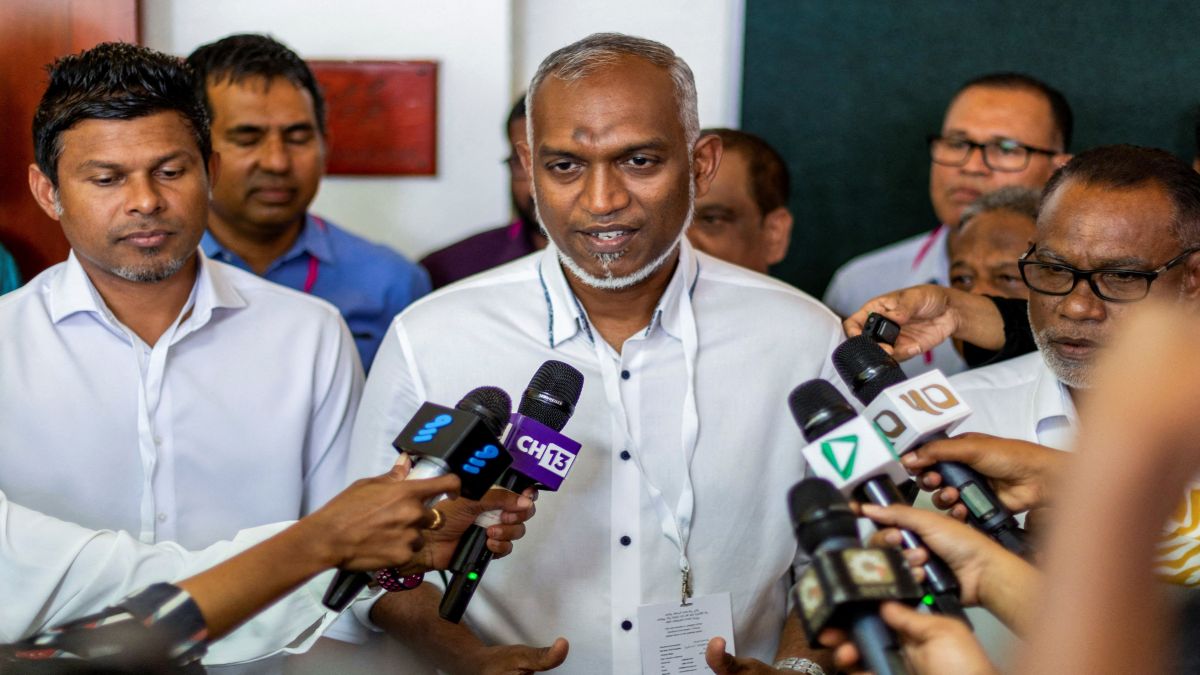Mohamed Muizzu came to power in the Maldives late last year. Since then, he’s constantly been in the news, albeit for all the wrong reasons. In fact, some would say, he’s controversy’s child. The latest controversy surrounding the Maldivian president is allegations of corruption. This has prompted the Opposition in the island country demanding a probe and the impeachment of Muizzu.
Maldives’ Muizzu has dismissed the charges. However, the timing of the claims is important; the election of Maldives’ Majlis — the legislative body — is scheduled for Sunday (21 April).
We take a closer look at the myriad of troubles faced by Muizzu since he won the elections in October 2023.
Corruption charges
Ahead of the elections on Sunday, Muizzu is facing corruption charges after a leaked report alleges him of the same. The allegations came to light on Monday (15 April) when a handle on X going by the name of Hassan Kurusee on X leaked intelligence reports, including documents prepared by the Financial Intelligence Unit (FIU) of the Maldives Monetary Authority and the Maldives Police Service. These linked President Muizzu to corruption.
These reports dated to 2018 claim irregularities in money transfers to President Muizzu’s personal bank account, highlighting 10 critical red flag indicators of financial misconduct. These indicators suggest involvement with politically exposed persons, embezzlement, structured transactions, and the use of corporate entities to hide fund origins, news portal Maldives Republic (mvrepublic.com) reported.
Reacting to the claims, the Opposition — the Maldivian Democratic Party and the People’s National Front — demanded an investigation and also an impeachment of Muizzu.
Impact Shorts
More ShortsHowever, Muizzu has dismissed all the allegations against him, accusing the Opposition of leaking the reports out of desperation. “While you attempt to pin something on me like this, you couldn’t do it before and you can’t do it now. There’s nothing you can show against me no matter how far you take this,” the Maldivian president was quoted as saying by Adhadhu.com.
He further stated that the money he had earned had come from renting his row house to foreign companies and the rest had been inherited after the death of his father. “I want you to keep talking about this vigorously. It’s you who will get exposed as much as you talk,” he said, referring again to the Opposition.
Missing the geo in politics
Muizzu stormed to power in October 2023. Since the election, he has revealed a pro-China bend and since becoming president, he has constantly tried to woo Beijing even at the cost of New Delhi.
This sentiment was heightened in January when Muizzu said, “We may be small, but that doesn’t give you the license to bully us.” The statement was a sign of defiance toward India and was made as he returned from China.
He further added that the Maldives is not in any country’s backyard and that the Indian Ocean does not belong to a single country — a reference to a recent tiff between the Maldives and India.
Additionally, he took a jibe at the previous Maldives government and said that the earlier administration used to take permission from a foreign country “before getting up from one chair and sitting on another.”
In response to his bully remark, External Affairs Minister S Jaishankar said in March that “big bullies don’t provide $4.5 billion aid” when neighbouring countries are in distress.
“The big change today in this part of the world is what has happened between India and its neighbours. When you say India is perceived as a big bully, you know, big bullies don’t provide $4.5 billion when the neighbours are in trouble. Big bullies don’t supply vaccines to other countries when COVID-19 is on or make exceptions to their own rules to respond to food demands or fuel demands or fertiliser demands because some war in some other part of the world has complicated their lives,” Jaishankar said at an event.
Prior to his bully remark, Muizzu had also courted headlines when ministers in his Cabinet made derogatory comments against Prime Minister Narendra Modi. It all began on 4 January when PM Modi posted breathtaking images of Lakshadweep on X. Soon after, three Maldivian ministers – Mariyam Shiuna, Malsha Shareef and Mahzoom Majid — commented on the images, calling the PM derogatory names, including a clown. In return, many in India called for tourists to boycott the Maldives, and one Indian travel company suspended flights.
It also prompted New Delhi to summon the Maldivian high commissioner to register its protest. It was only after the uproar that Muizzu suspended the leaders for their remarks.
Muizzu has also earned the ire from his Opposition for demanding that India withdraw its troops from the Maldives. He had then said: “There will be no Indian troops in the country come 10 May. Not in uniform and not in civilian clothing. The Indian military will not be residing in this country in any form of clothing. I state this with confidence.”
He has also put under the microscope dozens of pacts that Male signed with New Delhi in recent years.
Docking of Chinese ship
In January, Muizzu’s move of allowing a Chinese ship to dock at its port also raised eyebrows. Chinese research vessel Xiang Yang Hong 3 was allowed to moor at a dock in Male, with the Maldivian foreign ministry then saying, “The Maldives has always been a welcoming destination for vessels of friendly countries, and continues to host both civilian and military vessels making port calls for peaceful purposes.”
In response, India said it would monitor the vessel’s activity and ensure that it does not carry out any exploration activity in the Maldivian Exclusive Economic Zone. India had previously too expressed its reservations over surveillance activity of the said Chinese spy ship to Maldives last year. However, India’s objections, it seems, made little difference in the Maldives.
With inputs from agencies
)